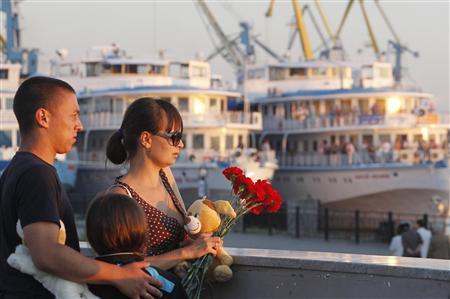
Medvedev Increasingly Marginalized In the Face of Domestic Challenges
Publication: Eurasia Daily Monitor Volume: 8 Issue: 135
By:

Russia has been hit by a number of manmade disasters. The worst is the sinking on July 10, of an old Bulgaria riverboat on the Volga River in Tatarstan. The Bulgaria was built in Czechoslovakia in 1955 and was rundown by age and neglect with one of its two main engines out of order during its last voyage as it took families on a one-night stopover weekend tour from the Tatar capital Kazan down the Volga River to the countryside. Tickets were cheap and the Bulgaria was returning to Kazan on July 10 overloaded with some 208 people on board. The official capacity of the Bulgaria was 140, there were 148 registered passengers, 25 unregistered and 35 crew: 99 women, 66 men and 43 children. The boat sunk in broad daylight, suddenly going down in three minutes without warning. Only 79 survived: 29 women, 39 men and 11 children. Divers had by July 14 recovered 105 bodies from the Bulgaria that is on the riverbed 18 meters deep – trapped in the hull, since there was no time for any orderly evacuation. The captain of the Bulgaria, Alexander Ostrovsky, went down with the ship (RIA Novosti, July 13).
The tragedy caused by apparent negligence and corruption has shocked Russia. Some survivors have accused the crew of not offering aid and the captains of passing ships of avoiding stopping to help. Kirill, the Patriarch of the Russian Orthodox Church, announced the disaster reflected the degree of immorality in Russian society and the greed “to make money, risking human lives by using obsolete equipment” (Interfax, July 12). In fact, the rescue after the boat sunk was reasonably well organized: Roman Lizalin (30) – the captain of a nearby passenger riverboat Arabella – sped to the scene, lowered lifeboats and recovered the survivors that managed to abandon the Bulgaria (www.newsru.com, July 13).
Lizalin has become a public hero. The authorities have promised to find and punish the guilty. President Dmitry Medvedev declared July 12, a national day of mourning and ordered checks into all passenger transportation in the country. Medvedev’s announcement was met with scorn: passenger aircraft and boats are already checked regularly, but this clearly does not help to stem corruption, while additional checks and restrictions will not change the fact that it is impossible to replace outdated equipment and infrastructure anytime soon. According to Rosstat (Federal Statistical Service) data, only 5.7 percent of river and lake vessels in Russia are relatively new – less than 10 years old (Vedomosti July 12).
On June 21, an old Tu-134 jet crashed while landing in Petrozavodsk in Karelia, killing 47 of the 52 on board. Medvedev ordered the speedy withdrawal of “the obsolete Tu-134 planes from service” (Interfax, June 23). On July 11, the day after the Bulgaria disaster, an old turboprop An-24 plane, built in 1975, crashed in Siberia. One of its two engines caught fire in mid air and the crew performed an emergency landing into the Ob River close to the shore, so it would not sink. Seven passengers of the 37 onboard died after the crash-landing. Once again Medvedev ordered the retirement of the archaic An-24 from service (RIA Novosti, July 12).
Medvedev ordered a halt all regular Tu-134 flights by January 2012 and gradually phase out charter flights. But today, 100 An-24 and over 90 Tu-134 aircraft are in service and a speedy retirement may leave large parts of Siberia and the Far East with little or no means of communications with the rest of Russia. Russia is the biggest nation in the world by territory, its roads are notoriously very bad and in most of Siberia and the Far East they are non-existent. The An-24, which has not been produced since 1979, seems particularly hard to replace – it can land and takeoff even from dirt airstrips. Airports, especially in the provinces of Russia have airstrips as bad as the roads, do not have modern radar or navigation gear and are otherwise unequipped to handle modern jet aircraft.
Medvedev’s orders were in effect overlooked by the government of Prime Minister Vladimir Putin. Deputy Prime Minister Sergei Ivanov announced this week: “Tu-134 and An-24 aircraft will be gradually withdrawn from regular passenger airline service beginning from January 2012, while charter passenger flights will continue” (RIA Novosti, July 13). Medvedev talks much about reforms and modernization, but has in effect turned into a lame duck.
The Russian transport infrastructure crisis took years to unfold and is indeed manmade. From 2000 to 2010 under Putin the number of civilian aircraft (planes and helicopters) declined from 6,500 to 6,000, while the number of relatively new ones (5 to 15 years old) declined from 57 percent to 7.2 percent. The number of aircraft 15 to 30 years old increased from 40 percent to 58 percent and aircraft over 30 years of age increased from 1.7 percent to 27.6 percent (Vedomosti, July 12). This collapse in quality was directly promoted by Putin’s policies of supporting Russia’s ailing aircraft industry by protective tariffs. Putin has been deliberately sabotaging Russia’s entry into the World Trade Organization (WTO) to keep high tariffs on aircraft, cars and other industrial produce. The result is disastrous: Russian air companies were anyway forced to import aircraft, because aviation industry could not build new planes of necessary quality or numbers to replace the decaying fleet. But imports tended to be also cheap and old – second hand assets.
Recently the government has began to lift some aircraft import tariffs, but it is too late – the time for an orderly and gradual modernization has been squandered – there is no spare production capacity in the world that could help Russia put its transport infrastructure in order. Putin has been boasting about the success of government support for the automobile industry by protective tariffs and subsidies. Russia’s roads are still being filled by millions of cheap, ugly and unsafe Lada cars that poison the environment and kill more Russians in crashes than planes or boats (Vedomosti July 12).




